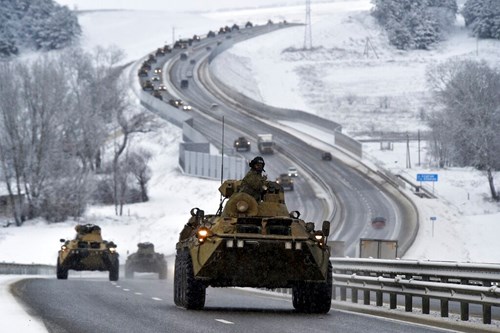Russia's news agency TASS announced last week the Kremlin’s military researchers have fielded a simulator with effects, such as a nuclear cloud, lights, and a shock wave, that simulates a ground-based nuclear explosion.
 That military advancement is not alarming by itself, since military researchers are always tinkering with war and death, but military analyst Bob Maginnis tells AFN the announcement should not be viewed as an isolated event.
That military advancement is not alarming by itself, since military researchers are always tinkering with war and death, but military analyst Bob Maginnis tells AFN the announcement should not be viewed as an isolated event.
“Why has Moscow changed its nuclear policy here recently?” asks Maginnis, referring to a new U.S. military study about Russia and nukes. “Why are they fielding a simulator to train their troops on nuclear responses, which is just what was announced by Tass?”
That military study was released January 22 by U.S. European Command. It concluded Russia’s losses in its Ukraine war have shattered Moscow’s “high confidence” it can defeat NATO in a conventional war – meaning a non-nuclear – if a military conflict breaks out, according to a Stars and Stripes article.
 The war in Ukraine, which will hit the two-year mark in mid-February, has decimated both sides in the conflict but accurate and reliable casualty numbers are disputed in an ongoing propaganda war over who is winning, and who is losing, and why.
The war in Ukraine, which will hit the two-year mark in mid-February, has decimated both sides in the conflict but accurate and reliable casualty numbers are disputed in an ongoing propaganda war over who is winning, and who is losing, and why.
A declassified U.S. intelligence report, released late last year, claimed Russia’s military has accumulated 315,000 casualties after two years of fighting, which is nearly 90% of its fighting force when the war began, according to NATO’s assessment.
Ukraine's military, too, is said to be hollowed out after two years of fighting and after a crucial summer offensive failed to meet its objectives.
Russian doctrine is 'escalate to de-escalate'
When the Ukraine war was in its first month, Maginnis told AFN at the time Russia’s military doctrine includes deploying battlefield nukes along conventional forces.
“Basically you use tactical nuclear weapons in order to gain a foothold,” Maginnis explained to AFN almost two years ago. “And then you exploit that with conventional forces, and then you de-escalate.”
That Russian military doctrine is known as “escalate to de-escalate,” which is based on Moscow’s belief NATO will view that battlefield nuke as a warning and will not retaliate with its own nuke.
 But what if NATO retaliates instead of surrendering, and then Russia retaliates to that retaliation? During the Cold War, that nuclear apocalypse was accurately described as M.A.D., or mutually assured destruction.
But what if NATO retaliates instead of surrendering, and then Russia retaliates to that retaliation? During the Cold War, that nuclear apocalypse was accurately described as M.A.D., or mutually assured destruction.
Now, two years after making those comments, Maginnis tells AFN he was alarmed to learn NATO might be planning to station nuclear weapons in the United Kingdom again. That speculation comes after someone noticed a budget item that mentions “surety,” which is military jargon for securing nuclear weapons safely.
According to British newspapers, the Pentagon plans to return B61 nuclear bombs to an RAF air base, Lakenheath, after they were removed in 2008.

“That suggests to me,” Maginnis says, “that there's a lot of thinking about what Russia's intentions are."
Last year, in March, Russia’s president Vladamir Putin announced he had ordered nuclear forces to station battlefield nukes in Belarus, the Russian ally that shares a border with Ukraine and Poland.
Not done with his alarming warnings, Maginnis also points out U.S. enemy Iran successfully launched three satellites into space just this week. That advancement in technology, he says, suggests the country has improved its rocket technology and hence the development of nuclear-capable, long-range ballistic missiles.
Iran, which is famously working to complete its nuclear weapons technology, is now waiting to see if and how the United States retaliates for the deaths of three U.S. servicemembers killed by a drone strike in Jordan.
"Really, this world is very, very unstable at the present time," Maginnis concludes. "A third world war is not out of the question."







